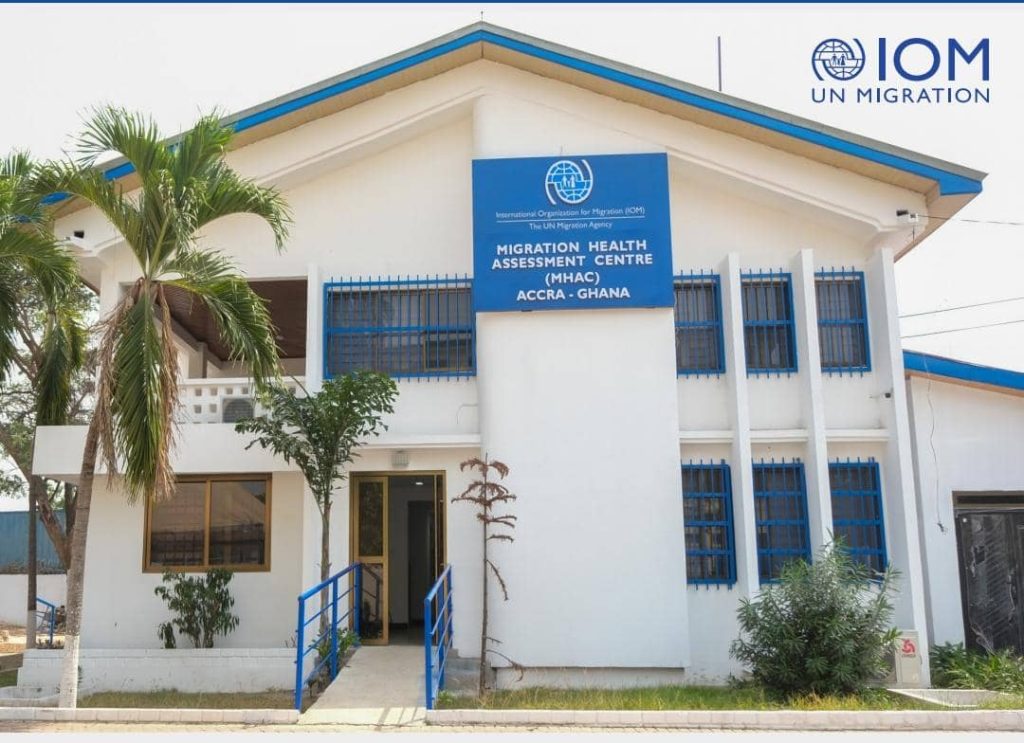By Patience Gbeze
Accra, Aug. 17, GNA – The International Organisation for Migration (IOM) has launched an ultra-modern Migration Health Assessment Centre (MHAC) in Accra to continue to deliver quality health to migrants.
Within its Migration Health Division (MHD), the IOM delivers and promotes comprehensive, preventive and curative health programmes that are beneficial, accessible, and equitable for migrants and the mobile population.
In 2021, MHAC was moved from Ridge, where it was operating since 2007 to its current location at Airport Residential Area.
The state of the art clinic is furnished with a laboratory, two x-ray machines, three consulting rooms, data capturing rooms, a conference room, among others.
Ms Abibatou Wane, the Chief of Mission, IOM for Ghana, Togo and Benin, said the Centre was not having some of the current facilities in the previous location and had to outsource, which sometimes slowed down the process.
“ But now with almost everything in house, this has increased speed and also being able to achieve our target for the year by the middle of the year.
“We also plan on having a children’s playground and breastfeeding area to also cater for the needs of lactating mothers and clients with kids to help make their process a comfortable one. There are also plans to establish a call Centre, which will also serve clients better,” she added.
Ms Wane said: “Health is an issue of importance to us all, and without good health it would be impossible to achieve the many dreams and hopes that we have.
“According to the Sustainable development goal three, everyone deserves good health and wellbeing, and to achieve universal health coverage, migrants cannot be left out of the equation.
“The Migration Health Division of IOM Ghana can now boast of being one of the best in Africa and also contributing to universal health coverage leaving no one behind,” she added.
She said after the Covid-19 pandemic, MHAC observed a decrease in the caseload, which started to picking up last year, when the Center reached 11,430 health assessment caseloads in 2021, and in the first seven months of 2022, it has already achieved 10,837 cases.
She applauded the team for overachieving their target just by the middle of the year, adding, “these could not have been possible without the hardworking staff here and the beautiful edifice we have here. The team today is composed of 22 staff and some more recruitment in the pipeline.”
The Chief of Mission said since 2007, IOM Ghana’s Health division has been providing assistance to migrants in conducting health assessments and travel assistance within the sub-region.

In 2009, she recounted, the Center became known as the Migration Health Assessment Centre under the Migration Health Division of IOM Ghana from what was previously known as the UK-TB Accra.
The Migration Health Division at IOM Ghana conducts migration health assessments and provides travel health assistance for refugees and immigrant visa applicants for selected countries.
It also provides medical services and coordinates migration health activities including health assessment, screenings, DNA sample collection, support to medical cases, and medical escort assistance as required, for 23 countries in West and Central Africa.
She noted the medical missions are conducted to strengthen health assessment and travel assistance capacity within the sub-region.
“IOM Ghana works in partnership with and is guided by multiple stakeholders in health and migration sectors.
“In Ghana, IOM engages closely with relevant government ministries, especially Ministries of Health and The Interior, and non-governmental organizations, as well as with Diplomatic entities, such as embassies and consulates and with key partners including relevant UN agencies (especially WHO, UNAIDS, UNHCR) and civil society partners, including migrants’ associations and academia,” she added.
At the request of receiving country governments, IOM provides an evaluation of the physical and mental health status of migrants prior to their departure for the purpose of resettlement, international employment, enrolment in specific migrant assistance programmes or for obtaining a temporary or permanent visa.
There is a diverse range of health assessment requirements among receiving countries. They may be specific to certain diseases of public health concern such as tuberculosis, as is the case with the United Kingdom Tuberculosis Detection Programme; requirements may also be more general in nature, or include additional interventions, such as vaccinations.
But despite differences in health assessment requirements among countries, one thing remains constant: the need to ensure that the migration process does not endanger the health of either the migrant or host communities.
Dr Naoum Marwan, IOM Regional Health Assessment Programme Coordinator, from the IOM Regional Office in Nairobi, Kenya, said the Ghana MHAC was the 26th in Africa.
He expressed the hope that by the end of the year there would be an additional two Centres, making it 28, to provide healthcare needs for the over 272 million migrants and 40 million internal migrants in the catchment areas.
Dr Samuel Ahadi Baghuma, Chief Migration Chief Officer, who took the invited guest on tour of the facility, said they undertake medical examinations on behalf of embassies for people traveling for a long stay either for studies or resettlement work.
GNA